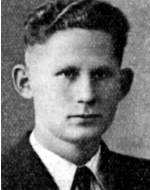Bregman, Moshe
Son of Pnina and Shmuel, was born on December 7, 1927 in Haifa and grew up in a traditional-observant home and a national-pioneering atmosphere. Because of material difficulties, he was forced to stop his studies at the elementary school at the age of 13 and began working as an apprentice and clerk in the Israel Electric Corporation and worked there for seven years before joining the Israeli army. Moshe loved to study, and in the evenings, after work, he prepared for the matriculation exams, which he passed with honors when he was 16 and a half. He also studied bookkeeping, English and French. The supervisor of his work wrote about him: “Be cheerful and kindhearted, and as a responsible person he was assigned special functions, which he would have faithfully fulfilled.” He had a sense of music and played a violin and an accordion. Immediately upon the outbreak of the War of Independence, he volunteered to serve in the Carmeli Brigade and was placed in a dangerous position between Hadar Hacarmel and Arab Haifa. One day he was slightly injured when he destroyed an Arab post by throwing a bomb at it, as a reward for the fall of his friend, but did not agree to leave. He took part in the guarding and protection of the endangered Jewish neighborhoods in Haifa and its environs, and in guarding the transport, under the watchful eye of the English. Two months after his induction he was sent to the defense of Sejera, and from there to Kfar Hahoresh. Moshe was sent to a squad commanders’ course that took place in Kibbutz Alonim, where he trained a group of recruits in Haifa and during the difficult battle against Ramat Yohanan he was sent and fought there. When he was asked by his family that he would stay with them at least on Passover Seder, he did not agree, saying: How would he leave his men in the position and he himself would be at home? Moshe was tall, handsome and strong, friendly and caring for his subordinates, Who was killed in the battle for the liberation of Haifa on April 21, 1948, A few moments after he phoned his father and asked him to accept fate because he was aware of the dangers he faced, Moshe was brought to rest in the military cemetery in Haifa.
